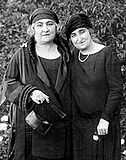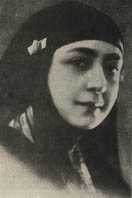Huda Shaarawi


Huda (or Hoda) Sha`arawi (Arabic: هدى شعراوي / ALA-LC: Hudá Sha‘arāwī; June 23, 1879 – December 12, 1947), was a pioneering Egyptian feminist leader, nationalist, and founder of the Egyptian Feminist Union
Early life and marriage
Born in Minya, she was a daughter of Muhammad Sultan, the first president of the Egyptian Representative Council. She was taught to read the Qur'an and received tutoring in Arabic, Farsi, Turkish, and Islamic subjects by female Muslim teachers in Cairo. Sha`arawi wrote poetry in both Arabic and French. She was married to her cousin Ali Pasha Sha`arawi, a leading political activist; he eventually played an integral role in his wife's emergence as a public figure, actively supporting her feminist movement and often including her in his political conferences and meetings. It was no secret that Ali Pasha often sought his wife's counsel and, on numerous occasions, had her sit in his stead at high level political meetings.
Feminism
At the time, women in Egypt were confined to the house or harem. When in public, women were expected to show modesty by wearing the hijab over their hair and faces. Sha`arawi resented such restrictions on women's dress and movements, and started organizing lectures for women on topics of interest to them. This brought many women out of their homes and into public places for the first time. Sha`arawi even convinced them to help her establish a women's welfare society to raise money for the poor women of Egypt. In 1910, Sha`arawi opened a school for girls where she focused on teaching academic subjects rather than practical skills such as midwifery.
After World War I, many women took part in political actions against the British rule. In 1919, Sha`arawi helped organize the largest women's anti-British demonstration. In defiance of British orders to disperse, the women remained still for three hours in the hot sun.
Sha`arawi made a decision to stop wearing her veil in public after her husband's death in 1922. In 1923, Sha`arawi founded and became the first president of the Egyptian Feminist Union, after returning from the International Woman Suffrage Alliance Congress in Rome she removed her face veil in public for the first time, a signal event in the history of Egyptian feminism. Women who came to greet her were shocked at first then broke into applause and some of them removed their veils.
Even as a young woman, she showed her independence by entering a department store in Alexandria to buy her own clothes instead of having them brought to her home. She helped to organize Mubarrat Muhammad Ali, a women's social service organization, in 1909 and the Union of Educated Egyptian Women in 1914, the year in which she traveled to Europe for the first time. She helped lead the first women's street demonstration during the Egyptian Revolution of 1919, and was elected president of the Wafdist Women's Central Committee.
She led Egyptian women pickets at the opening of Parliament in January 1924 and submitted a list of nationalist and feminist demands, which were ignored by the Wafdist government, whereupon she resigned from the Wafdist Women's Central Committee. She continued to lead the Egyptian Feminist Union until her death, publishing the feminist magazine l'Egyptienne (and el-Masreyya), and representing Egypt at women's congresses in Graz, Paris, Amsterdam, Berlin, Marseilles, Istanbul, Brussels, Budapest, Copenhagen, Interlaken, and Geneva. She advocated peace and disarmament. Even if only some of her demands were met during her lifetime, she laid the groundwork for later gains by Egyptian women and remains the symbolic standard-bearer for their liberation movement.
Her book, The Harem Years, published in English in 1987 under the title Harem Years: The Memoirs of an Egyptian Feminist, 1879-1924, is a firsthand account of the private world of a harem in colonial Cairo, Sha`arawi recalls her childhood and early adult life in the seclusion of an upper-class Egyptian household, including her marriage at age thirteen. Her subsequent separation from her husband gave her time for an extended formal education, as well as an unexpected taste of independence.
Sha`arawi was involved in philanthropic projects throughout her life. In 1908, she created the first philanthropic society run by Egyptian women, offering social services for poor women and children. She argued that women-run social service projects were important for two reasons. First, by engaging in such projects, women would widen their horizons, acquire practical knowledge and direct their focus outward. Second, such projects would challenge the view that all women are creatures of pleasure and beings in need of protection. To Sha`arawi, problems of the poor were to be resolved through charitable activities of the rich, particularly through donations to education programs. Holding a somewhat romanticized view of poor women's lives, she viewed them as passive recipients of social services, not to be consulted about priorities or goals. The rich, in turn, were the "guardians and protectors of the nation."
Bibliography
- (عصر الحریم - یحکی مذکرات المرأة المصریة فی الفترة ما بین (1880–1924 - Translated to English by Margot Badran as Harem Years: The Memoirs of an Egyptian Feminist.
See also
- Women's literary salons and societies in the Arab World
- List of women's rights activists
- Timeline of first women's suffrage in majority-Muslim countries
- Timeline of women's rights (other than voting)
- Timeline of women's suffrage
References
External links
| Wikimedia Commons has media related to Hoda Shaarawi. |
|